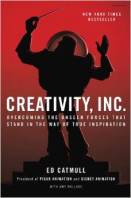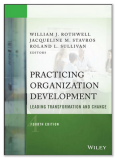Filed under: - People Change Management
 In May 2014 the OutPerform Model © was soft launched at The Conference Board of Canada’s annual Change Management conference and I shared it with you here in June.
In May 2014 the OutPerform Model © was soft launched at The Conference Board of Canada’s annual Change Management conference and I shared it with you here in June.
This post elaborates on each of the 6 components.
Why is an integrated approach to strategy execution important? continue reading here
Filed under: - Personal Reflections
 In case you missed it this weekend, the war of words is on. Here’s where I picked it up:
In case you missed it this weekend, the war of words is on. Here’s where I picked it up:
- Adam Grant published “Unless You’re Oprah, ‘Be Yourself’ Is Terrible Advice”.” in the New York Times June 4 2016. There was much about this piece that resonated for me, most particularly the finale phrase, “Next time people say, “just be yourself,” stop them in their tracks. No one wants to hear everything that’s in your head. They just want you to live up to what comes out of your mouth”.
Admittedly I did not critique the piece rather took what had value for me, shared it with my network on LinkedIn and moved on.
- Then Brené Brown weighed in using her LinkedIn Pulse blog with “My response to Adam Grant’s New York Times Op/ED: Unless You’re Oprah, ‘Be Yourself’ Is Terrible Advice”. Well, that raised several issues that I had overlooked!
- Not to be outdone, here comes Adam Grant, also now on his LinkedIn Pulse blog with “The Dangers of Being Authentic . And, given that each of my “likes” goes out on my Twitter feed (@gailseverini) I got an interesting twist in a direct tweet from @adamgrant referring me to this post!
Well if “likes” and comments count for anything, as at today, Brown is winning with 5745 likes and 766 comments vs 2179 likes and 390 comments for Grant (yes it’s not a perfect proxy but it’s interesting).
[All: Adam Grant posted a reply on Brene Brown’s LI post – please see the comments below]
A little more context
Both Adam Grant and Brené Brown are established and reputable thought leaders (as far as I can tell) and authors. Looks to me like they work in adjacent if not overlapping space.
Brené Brown also just keynoted the finale keynote at The Association of Change Management Professionals annual conference May 18 2016. Her work resonates for me and her keynote illuminated the application of this work on shame and inadequacy in leading and managing change. From speaking with my network I think it resonated with most of that audience. By “resonated” I mean to say “made sense”, “felt true”, “was consistent with what I have observed and dynamics I have experienced”.
With the most recent salvos, which are likely not over, it seems they disagree on some key points.
What is going on here?
That they disagree is actually not the issue for me – though there is very rich insight to be had by reading through each of their cases (which I will probably have to do many times). I am certainly not qualified to comment on their arguments and I won’t even attempt a synopsis (seems to me that one would have to know each of their bodies of work to do justice to that) and they make their cases eloquently enough.
As a mainstream business professional, it’s tough to know what might be really going on behind the scenes here. I get it that they want / need to defend their positions and I am told that academics hold to their theses fiercely and defending them in the academic arena is something of a gladiator sport. I hope that’s not where this is going. While there must be value in such an approach, for me anyway, it looks more of like watching a train wreck than building of a space station.
I will hazard a guess tho that they are both “triggered”, i.e. now reacting emotionally to what appears on the surface to be an academic debate. One has to wonder why but probably does not need to look too far. As the face-off escalates there is more at risk: their professional reputations, credibility, standing in their professional communities, readership, followship, book sales (today and future), etc. It has got to be hard to stay centered in the face of these stakes … and yet, this is what is called for.
Wouldn’t we all benefit, as surely they would, if they would sit down together and explore the adjacencies and overlaps of their work – explore their differences dispassionately. Even as I write, and you read, the word “dispassionately” it seems hard to imagine that this might have been possible before the debate let alone now …
This plays out all day every day in organizations
I think about the analogy that Brené Brown shared with us at ACMP about the stories that play in our heads, ie that in a situation where we might think we have all the information we are actually only connecting the dots that we know and often in ways that the other party is not – perhaps there are different dots in their stories. We don’t know if we don’t have the courage of an open, honest and generous conversation.
Eating your own dogfood
I don’t know Adam Grant’s work at all, beyond that post above, but I wonder if he talks about great leadership, teamwork, problem solving, etc. Surely Brené Brown does.
Surely they could bring some of their own advice to resolving this constructively? Seems to be that there is much in the space between these two great minds that could be better because through collaboration.
From the surface it looks like trust would have to be patched up and developed gradually. Perhaps an independent moderator could hold space for them to have a vibrant but respectful and productive conversation?
We are all human
Seems trite but this day this is what I walk away with. Even great minds are human.
Understanding what it means to be human is what makes us more successful together.
So much opportunity ahead of us.
What do you think?
How does this play out for you? Have you followed either or both Adam Grant and Brené Brown?
Are you interested in authenticity? From what perspective? ie. are you working from your own interpretation or do you reference any particular research?
This topic, authenticity, has driven me somewhat mad for ages (past posts below) and I follow it with interest. I don’t think we have it figured out and furthermore that misinterpretations are degrading our ability to deliver change (strategy, innovation, etc by whatever name you prefer). An example would be the critical need for leaders to become the change first (to shift their own mindsets and behaviors ahead of their teams) in order to have credibility and build trust that it will work, they are committed and they will ‘cover’ their teams (hence my joy at Adam Grant’s phrase).
How do you think this plays out in our work? Seems to me that such research is critical for us to advance our work so it is essential that the research is sound and applicable.
Please do share your thoughts in the comments. This is a learning journal for me and I appreciate your insights. I hope you get something of this exercise in working out loud.
Related Posts:
- When Harvard Professors Duke It Out – The Ugly Debate On Clayton Christensen’s Theory Of Disruptive Innovation
- Stepping up to “authentic” leadership
- Authenticity is an over-rated leadership attribute

Change Whisperer by www.gailseverini.com is licensed under a Creative Commons Attribution-NonCommercial 3.0 Unported License.
Filed under: - Organization Change Management, - People Change Management, - Personal change, - Personal Reflections, - Professional Development | Tags: Change Management, Professional Development
“As far as inner transformation is concerned, there is nothing you can do about it. You cannot transform yourself, and you cannot transform your partner or anybody else. All you can do is create a space for transformation to happen, for grace and love to enter.” ~Eckhart Tolle
We left off the last post with a project scenario, a discussion of some of the dynamics in the project team and a resolution to work on creating space to process personal emotional triggers properly and build the “muscle” to operate in real time.
The weird thing
On a good day I begin with a calm and objective assessment of the situation. I remain centered and effective.
I can review whether our plans and execution were appropriate and effective, and can develop mitigation strategies if necessary. continue reading here
Filed under: - Organization Change Management, - People Change Management, - Personal change, - Personal Reflections, - Professional Development | Tags: Change Management, Professional Development
“The people who trigger us to feel negative emotion are messengers. They are messengers for the unhealed parts of our being.” Teal Swan
I was speaking with a senior, experienced change practitioner, whom I have deep respect for, a couple of weeks ago and we got around to talking about what was, for me, a guilty secret:
I am often triggered by the change I am working on. It is likely my #1 challenge.
“What does that mean?” you might say. Well, it means that I sometimes get frustrated enough that I temporarily lose my mind … I mean … I lose objectivity.
Truth is: something occurs that I start to take personally – and it’s … distracting. continue reading here
Filed under: - Organization Change Management, - People Change Management, - Personal change, - Personal Reflections, - Professional Development | Tags: Change Management, Professional Development
“A healthy self-love that leads to true happiness is what Rousseau called “amour de soi”. It builds up one’s intrinsic well-being as opposed to feeding shallow cravings to be admired. Cultivating amour de soi requires being fully alive at this moment as opposed to being virtually alive while wondering what others think.” “Narcissism is increasing. So you’re so not special”, New York Times, Arthur C. Brooks, Feb 13 2016
 In the previous post we looked at why we do this work – because passion is important for the journey. Now we will look at how we practice.
In the previous post we looked at why we do this work – because passion is important for the journey. Now we will look at how we practice.
Filed under: - Organization Change Management, - People Change Management, - Personal change, - Personal Reflections, - Professional Development | Tags: Change Management, Professional Development
“A confession has to be part of your new life.” Ludwig Wittgenstein
 The beginning of a new year always holds a strange promise – and pressure – to manage one’s own personal change in the larger continuum of one’s life.
The beginning of a new year always holds a strange promise – and pressure – to manage one’s own personal change in the larger continuum of one’s life.
The convention that one should look back on the last year and forward to the next one with the objective of re-setting, re-calibrating and re-imagining our lives is a powerful one.
Filed under: - Change Execution, - CM Resources, - People Change Management, - Professional Development, - Strategy and Imperatives, - Strategy Execution | Tags: Leadership, Professional Development, Strategy
 As the world changes, is your Strategy and Strategy Execution keeping up? Is your organization effectively transforming to outperform your competitors?
As the world changes, is your Strategy and Strategy Execution keeping up? Is your organization effectively transforming to outperform your competitors?
Conferences are a great way to tap into thought leadership and innovation.
Here’s a little more motivation – from Strategy&’s “Research on the Strategy Execution Gap”:
- “46% of respondents say they’re concerned their company’s strategy isn’t bold enough and that “the goals it sets aren’t high enough for us to win.”
- “A majority of executives – 55% – say they are concerned that their company “is not focused on executing our strategy.””.
Filed under: - CM Resources, - Organization Change Management, - People Change Management, - Professional Development, - Strategy Execution | Tags: Change Management, Organization Development, Professional Development, Training
 If it seems like change is endless … well it is endless. Maybe we should think of it as evolution instead.
If it seems like change is endless … well it is endless. Maybe we should think of it as evolution instead.
For the last 5 or so years the general theme has been “we live in a VUCA world, how can we change faster?”
Hopefully in the coming years we will adapt our own view towards “Embrace ‘new normal’ – let’s adapt our organizations accordingly”.
Will we eat our own dog food? What are the trends and hot topics this year? Check out the conference agendas listed below.
Filed under: - CM Resources, - Organization Change Management, - People Change Management | Tags: Change Management, Execution, Organization Development, Strategy
“It is not our differences that divide us. It is our inability to recognize, accept, and celebrate those differences.”—Audre Lorde
Beneath the surface of professional dialogue there are a few hot “political” topics.
A while ago I stumbled onto an online discussion between Organization Development (OD) practitioners.
This suddenly explained the guardedness that I experienced in conversations with “them” around Change Management (CM). continue reading here
Filed under: - Innovation, - Leadership, - Organization Change Management | Tags: - Innovation, Change Management, Culture, Leadership
“Since change is inevitable, the question is: Do you act to stop it and try to protect yourself from it, or do you become the master of change by accepting it and being open to it? My view, of course, is that working with change is what creativity is all about”. Ed Catmull, “Creativity, Inc.: Overcoming the unseen forces that stand in the way of true inspiration”, Random House Canada, 2014.
 I start a lot of books these days but I don’t finish that many. I just finished this one and I have to say, it was worth it.
I start a lot of books these days but I don’t finish that many. I just finished this one and I have to say, it was worth it.
“Creativity Inc” is a story about drive, determination and creativity and how leaders build and sustain a culture of world class innovation. It is about the application of important change management principles, even if not called out as such. Most of the middle of the book addresses pragmatic approaches that Catmull used at Pixar that every company can modify and apply.
We can learn a great deal from their journey. Start-up innovation might be the most difficult class of “change”. It involves constantly transforming so as to invent a future that is completely uncharted territory. Here are a few highlights that resonated with me. Continue reading
Filed under: - Change Execution, - Organization Change Management, - People Change Management, - Project Management, - Strategy and Imperatives, - Strategy Execution | Tags: Change Management, Planning, Projects, Transformation
 As noted in the previous post, “Enterprise change vs project change”, we are having a vibrant discussion in the Organizational Change Practitioners Group on LinkedIn on whether change management is serving Enterprise change adequately.
As noted in the previous post, “Enterprise change vs project change”, we are having a vibrant discussion in the Organizational Change Practitioners Group on LinkedIn on whether change management is serving Enterprise change adequately.
The dialogue is being shaped by many experienced practitioners. continue reading here


